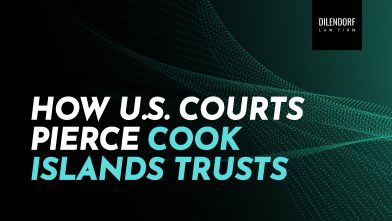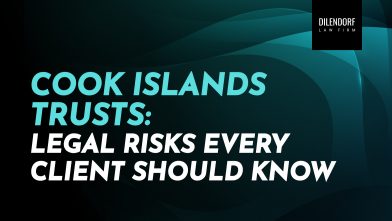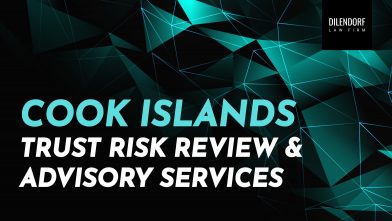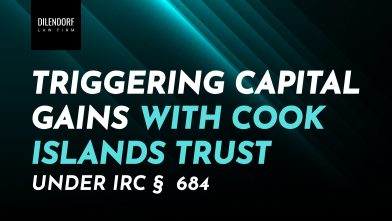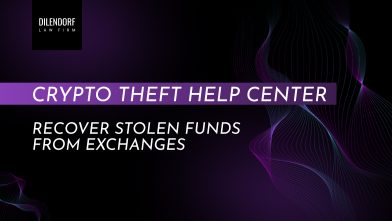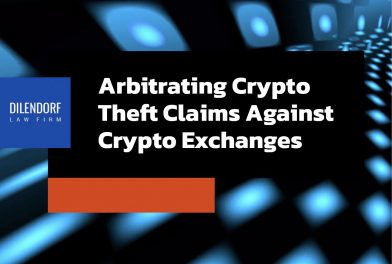Launching Real Estate DAOs: What, Why and How
The decentralized autonomous organizations (DAO) market has heated up, with 20 of the largest decentralized organizations holding $6B worth of digital assets. DAOs are being increasingly utilized to attract new investors under a flexible corporate structure, notably in real estate.
While tokenizing real estate investments in a DAO offers many advantages, issuers must structure them carefully and properly to protect investors. Tokenization involves representing ownership of an interest in real estate with virtual tokens that exist on a blockchain (forming a type of DAO security token).
It’s important to remember that real-estate DAO tokens will virtually always qualify as securities under state and federal law.
DAOs may be established anywhere and can attract investors from multiple jurisdictions due to their decentralized nature. Creating a real estate DAO will require tokenization of the underlying assets.
Creating a compliant real estate DAO is a complicated process, both technically and legally. Companies interested in launching a real-estate-backed DAO tokens must carefully consider and resolve a wide range of issues when planning, developing, and launching their real-estate token.
Why Real Estate DAOs?
Real estate has nearly always been considered a relatively safe investment. Yet, real estate transactions also tend to be some of the most complex and expensive, rendering real estate itself relatively illiquid. But a new method of engaging in such transactions promises to go even further in transforming the purchase, holding, and sale of real property: real estate DAOs.
Tokenization involves representing ownership of an interest in real estate with virtual DAO tokens that exist on a blockchain (forming a type of security token). Rather than dealing with regular real estate interests in an outdated manner using paper documents, purchasers are able to engage in transactions digitally using tokens.
Tokenization is flexible: a DAO token could represent ownership of the underlying real asset, an equity interest in a legal entity that owns that asset, an interest in a debt secured by the asset, a right to share in profits arising from the use of the asset, and more.
Types of Real Estate DAO
The types of real property involved can also vary widely, including single-family homes, multifamily structures, office buildings, warehouses, retail spaces, and everything in between. The flexibility of real estate DAO tokenizations to diverse asset classes, coupled with non-US investor demand requires careful cross-border planning to ensure the tax-efficient holding of such U.S. investments.
That ownership is recorded on a blockchain, and smart contracts are written to determine what ownership means (voting rights, amount of tokens distributed, dividends, payouts, etc.).
A comparable structure in traditional real estate investment is the co-op, where shares in a building are sold to residents, and those shares give owners certain rights. Members of a co-op vote on board members and the benefits attached to ownership. Co-ops also contain bylaws that codify these rules, as well as other policies such as voting quorums, how notices are provided, etc.
These bylaws can be coded into smart contracts so that they operate efficiently and without room for human corruption. This ensures effective management of a tokenized asset through rules that are voted on by owners and then written into coded.
DAO Tokenization Strategy: Legal and Other Considerations
Companies interested in developing a real-estate DAO must carefully consider a host of legal and other issues in connection with their offerings. These issues are highly complex and require the assistance of experienced real estate, securities, tax, and blockchain attorneys and other professionals. Some of the most significant issues that must be considered and dealt with are:
- Type of Interest
- Legal Entity
- Smart Contracts
- Securities Regulations
- Corporate Code (including other entity types)
- Tax and Reporting Considerations
- Asset Type
- Location
- Tokenization Ratio
- Mortgage Issues
- Tracking Tokenholders
- AML/KYC/Investor Accreditation
- International Sales
- Other Legal and Regulatory Regimes
Securities Regulations
Real-estate DAO tokens will virtually always qualify as securities under state and federal law. As such, they must be registered with the Securities and Exchange Commission (SEC) or satisfy an exemption from registration. Failure to satisfy this requirement can result in substantial civil penalties and give investors a right to rescind their purchases and receive a full refund.
A company does not necessarily have to be incorporated in the U.S. for a compliant DAO. U.S. securities laws allow certain offerings to be conducted by foreign issuers.
Of course, most issuers will not seek to register with the SEC, but structure their security token offerings as exempt transactions. In doing so, they will choose from among several available exemptions, including Regulation A+, Regulation CF, Regulation D, and Regulation S.
These regulations impose different requirements on the offering, from limitations on who may invest, to limits on the amounts raised, to resale restrictions on investors.
It is highly important to embed into the DAO token all the restrictions mandated by the securities regulations. For example, one of those limitation to be kept in mind while considering incorporating in the U.S. is the so-called “2,000 holders of record” rule. The rule applies differently to U.S. issuers and foreign issuers.
Under Section 12(g) of the Securities Exchange Act of 1934, U.S. issuers with total assets above $10 million and more than 2,000 holders of record of the company’s equity securities (or 500 holders of record who are not accredited investors) must register those equity securities with the SEC.
In the case of foreign private issuers, the registration is not required unless the issuer reaches 300 U.S.-resident equity holders of record. SEC registration is a lengthy and expensive process that also involves ongoing reporting obligations; it is generally not feasible for preferred-share-token issuers.
Regulation CF Offering
For example, the most commonly used exemption for tokenizing real estate is Regulation CF Offering. This exemption allows a company to raise up to $5M million through crowdfunding offerings in a 12-month period.
Regulations CF creates a streamlined registration process for smaller real estate developers, operators, and funds to experiment with real estate tokenization and secondary market trading of tokenized securities. The set-up process for launching a tokenized real estate Reg. CF offering could take as little as 5-6 weeks.
Considering the Investment Company Act
In addition to securities regulations, U.S. and foreign issuers of real estate DAOs may inadvertently find themselves subject to the Investment Company Act of 1940 (“ICA”). If a company’s business substantially consists of holding securities of other entities, that company may be considered an investment company under the ICA. Investment companies are subject to registration and a high level of costly compliance.
The risk of being classified as an investment company is particularly acute for a DAO SPV that holds shares of a sponsoring real estate operating company for the purposes of a DAO and that does not conduct any other business.
However, like the securities regulations, the ICA contains several exemptions that can be utilized by both U.S. and foreign issuers to structure a compliant DAO while avoiding burdensome registration as an investment company.
Legal Considerations with the Current DAO Landscape
The SEC has increased its focus on DAOs as part of its regulation-by-enforcement regime. Instead of undertaking the traditional rulemaking process, the SEC has chosen to find aspects of DAOs it does not find palatable and bring enforcement actions against the issuers. In many cases, there is a risk that the SEC could find that DAO tokens are securities and that issuers violated the Securities and Exchange Act of 1934 by offering unregistered securities.
As such, it is important to structure a real estate DAO that complies with state and federal securities regulations to avoid legal risks of future enforcement actions and investor lawsuits. Legal and tax professionals can assist their clients with properly structured tokenization and the secondary market process.
Tax and Reporting Considerations
Although the Internal Revenue Service has provided general guidance regarding the taxation of “virtual currencies” like bitcoin, many aspects of how U.S. tax law treats the purchase, holding, disposition of, or income from virtual tokens remains uncertain. Issuers and investors should consult a tax professional for help in developing a comprehensive tax strategy.
Moreover, DAO token issuers must be aware of any reporting requirements they may have, tax-related or otherwise. For example, issuers that rely on Regulation A+ for an exemption from registration under U.S. securities laws may be required to file regular reports with the SEC after the offering.
Furthermore, DAOs present an interesting question for taxation, specifically whether they should be taxed as a C-corporation (subject to double taxation), or a limited liability company. The answer will primarily depend on whether the DAO targets U.S. v non-U.S. investors or both. Before shares in a tokenized asset can be issued, DAO creators must work with their tax advisors to determine the most optimal tax structure for their DAO.
Preparing corporate documents for Real Estate DAO
In addition to making sure that a DAO is allowed by the corporate and securities laws of a chosen jurisdiction, the issuance should be sufficiently authorized by and described in the internal corporate governance documents, such as the certificate of incorporation, bylaws, shareholder agreements, resolutions and consents.
At this stage, generally, the issuer’s goal is to properly charter (a) authority to issue tokenized DAO equity; (b) corporate procedures related to tokenized DAO equity and secondary market trading; (c) the rights and responsibilities that attach to each class of preferred share tokens.
Depending on the jurisdiction of formation, an issuer’s board of directors may have very broad authority to determine the dividend, distribution, liquidation and conversion rights and obligations for each class of preferred share tokens.
All the terms of the real estate DAO will be reflected in the offering documents, which will vary depending on the type of underlying real estate asset and the particular exemption (or exemptions) from registration utilized by the issuer.
However, a properly structured DAO will typically involve preparation of an offering memorandum or prospectus to be distributed to prospective investors (“OM”).
The OM will contain numerous provisions to be considered by investors, including an executive summary and description of the real estate project project; legal notices to investors; an overview of the real estate sponsor and its corporate structure; description of the real estate company’s management team; financial information; disclosures concerning any conflicts of interest; terms of the DAO token and the offering, including how the funds raised will be used; risk factors, purchase and resale restrictions; disclaimers and so on.
In addition, the investors will have to sign a Subscription Agreement or Purchase Agreement containing terms and conditions for purchasing the DAO tokens, including representations by the company and the investor, payment and delivery terms, transfer restrictions, etc.
Investor Onboarding and DAO Token Sale
hitelisting and onboarding of investors is as an indispensable part of a compliant real estate DAO. A lot of companies retain specialized technology providers, so-called DAO issuing platforms or digital security management platforms to program DAO token, issue it and facilitate a security token sale, including onboarding the investors and processing their payments.
DAO sponsors should always examine the reputation, technical capabilities and licenses of a tokenization service provider before retaining one.
Holding payments from a blacklisted person may expose an issuer to liability risks that could not be negated by simply returning the questionable funds to such person. Some issuers and platforms overlook this sequence and expose themselves to unnecessary liability.
It would be undesirable for a DAO project to allow based in countries like Russia, Iran, and North Korea to trade on its tokens. Digital assets have been used to launder money out of sanctioned jurisdictions, especially during the recent wave of economic sanctions against Russia. To sum it up, Know Your Customer (KYC) rules are critical for every DAO project.
After the KYC/AML/accreditation checks, the qualified investors’ identities must be tied to and associated with their respective digital wallets. Since a compliant DAO token sale and distribution is conducted on blockchain, the identities of investors will be represented by the wallet addresses that will hold security tokens.
So, tokenization platforms must provide ways to associate the off-chain KYC information and on-chain identity of investors via digital wallets to be integrated into or provided by the platform. The smart contracts underlying a successful and secure DAO must pay attention to KYC and AML controls. Instituting these protections will bolster a DAO’s ability to fend off hackers and secure its investments.
Secondary Trading of DAO Security Tokens on ATS
To launch a successful and secure DAO, issuers will need to meet compliance standards, create a stable governance structure, and have shares that are able to be traded on the secondary markets called Alternative Trading System platforms (“ATS”) like tZero, Securitize or INX.
Finally, the minted DAO tokens must be compatible with the chosen regulated ATSs to be listed and tradable. This challenge should be addressed beforehand as different tokenization platforms and ATSs have
different standards and protocols – some are still being restructured or developed.
The DAO sponsors should establish contacts with the ATS of their choice before the primary issuance to ensure that the issuer’s and platform’s configurations of digital securities match and the pre-listing procedures required by the ATS are adhered to.
Some of the ATS platforms offer all-in-one tokenization, marketing and listing services, which may simplify your task but still require an in-depth due diligence on the possible issues outlined above.
If the offering is poorly structured or documented, the digital security’s features are unenforceable for secondary trading, or if the security tokens are incompatible with the selected ATS, blockchain projects may be tempted by a seemingly simple technical solution – recalling the flawed security tokens and replacing them with the new ones.
However, this may not be possible or may be costly and complicated from the legal standpoint, as one cannot always simply recall the issued securities, albeit in the form of digital tokens.
Defects in a DAO itself may be incurable for legal compliance purposes and may disqualify the security from being listed on a regulated trading platform.
So, getting your real estate DAO tokens to secondary market is something to consider well in advance, or risk the loss of the digital security’s value, or even liability for violation of securities and other laws.
Notes on Choosing ATS and Broker Dealers for Your DAO
A team of professional advisers should be able to assist DAO issuers to determine which ATS platforms and broker-dealer are best for them.
First, there are jurisdictional considerations to be aware of. For example, Singapore, Malaysia, Thailand, Gibraltar are actively developing markets for security tokens and regulated DAOs.
In choosing an ATS, there are factors such as offering density and built-in blockchain interoperability protocols with other ATS platforms. Depending on the asset and offering size, it may make sense to list on multiple ATS (e.g., listing an offering on ATS platforms in New York and Singapore).
DAO sponsors can choose to work with multi-national broker-dealers to attract international investors, opening another investment pool that is not available in traditional real estate. A massive benefit of tokenization is the ability to raise capital through international investors, creating new markets and greater opportunities for DAO issuers.
There are tight-knit consortiums of broker-dealers and ATS, which could be an opportunity for efficiency gains. It is important to conduct thorough due diligence before choosing a broker-dealer and ATS because making the wrong choice could lead to the expensive process of burning and switching tokens.
Conclusion
Tokenization and DAOs have has the potential to change the way people invest in real estate and other types of assets all over the world. DAO tokenization is subject to a complicated web of legal and practical issues, any one of which could make the difference between success and failure.
The U.S. regulatory environment already allows compliant DAOs and is expected to develop further. At present, while the tokenization process can be a challenging task because it involves complex corporate, securities, tax and other considerations and limitations that preexisted the concept of digital securities on a blockchain, it also offers short and long term benefits that real estate operators seeking to raise capital should consider leveraging.
Accordingly, the considerations outlined above should not prevent the proliferation of digital securities and may be used as a step-by-step guidance to a successful equity tokenization project in 2022.
Consequently, DAO sponsors and developers should consult knowledgeable securities, tax, accounting, and legal professionals early in the process of planning a real-estate security token. These professionals can help guide the development and launch of the token in a way that minimizes unnecessary risks and costs.
This article is provided for your convenience and does not constitute legal advice. The information provided herein may not be applicable in all situations and should not be acted upon without specific legal advice based on particular situations. Prior results do not guarantee a similar outcome.
Resources:
- Decentralization, DeFi and MarketDAO
- Blockchain, Smart Contracts & DAO
- SEC Issues Investigative Report Concluding DAO Tokens, a Digital Asset, Were Securities
- Report of Investigation Pursuant to Section 21(a) of the Securities Exchange Act of 1934: The DAO
- Law and the Blockchain
- The Data Briefing: I, For One, Welcome Our New Chatbot Blockchain Digital Autonomous Organizations
- Cryptocurrency Enforcement Framework
- U.S. Dept. of the Treasury, Fin. Crimes Enf’t Network, What is the BSA Data?
- FinCEN Guidance FIN- 2019-G001, Application of FinCEN’s Regulations to Certain Business Models Involving Convertible Virtual Currencies
- CFTC Staff Issues Advisory for Virtual Currency Products
- Lael Brainard, Fed. Reserve Governor, “An Update on Digital Currencies”
- DoD Digital Modernization Strategy
- The FATF Recommendations: International Standards on Combating Money Laundering and the Financing of Terrorism & Proliferation
- FATF REPORT – Virtual Currencies Key Definitions and Potential AML/CFT Risks
- FBI Expects a Rise in Scams Involving Cryptocurrency Related to the COVID-19 Pandemic
- I.R.S. Notice 2014-21
- Operator Of Bitcoin Investment Platform Pleads Guilty To Securities Fraud And Obstruction Of Justice
- TREASURY ORDER 180-01. Financial Crimes Enforcement Network
- FinCEN Issues Guidance on Virtual Currencies and Regulatory Responsibilities
- Ripple Labs Inc. Resolves Criminal Investigation
- Office of Foreign Assets Control – Sanctions Programs and Information
- Treasury Sanctions Individuals Laundering Cryptocurrency for Lazarus Group
- OCC Interpretative Letter #1170, Authority of a National Bank to Provide Cryptocurrency Custody Services for Customers
- U.S. Dept. of the Treasury, Fin. Crimes Enf’t Network, FinCEN Advisory FIN-2012-A001: Foreign-Located Money Services Businesses
- Regulation CF Crowfunding for Tokenizing Real Estate
- Regulation Crowfunding, General Rules and Regulations
- Crowfunding for Investors – Updated Investor Bulletin

